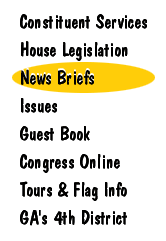

reference link:
Will It
Be Business As Usual At The World Bank? by Delphine Djiraibe
and Korinna Horta, Los Angeles Times, 5/9/00
|
The World Bank Doth Protest
December 17, 2000
A World Bank staff member complains that "the Chadian government did not provide us with relevant information until after the fact," referring to the revelation that Chadian President Idriss Deby spent $4.5 million of a World Bank loan package for a new oil pipeline on weapons [news story, Dec. 5].
This is feigned ignorance. For years, citizens' groups,
human rights advocates and environmental activists in
Chad and around the world have been warning the
bank that its loan package (worth more than $300
million) for this pipeline was likely to exacerbate the
country's civil war and worsen an already-dismal
human rights and corruption record. Even when
presented with a Harvard Law School study that said
Chad's government was unlikely to invest oil revenues
in programs to help the poor, the World Bank insisted
Chad could be trusted.
In the days leading up to the bank's vote on whether
to approve the project, reports from Chad indicated
that military and administrative officials loyal to Mr.
Deby went into villages in the oil-producing region and
threatened to kill anyone who opposed the oil
extraction. That the World Bank now expresses shock and dismay is hypocrisy. Oil drilling benefits big oil companies and corrupt officials but rarely the poor. It is time for the World Bank to wake up and stop wasting taxpayer money on such ill-conceived projects.
U.S. Representative (D-Ga.) Washington
The Honorable James D. Wolfensohn
I am writing in reference to follow up to my letter dated September
16, 1999, that I have not received a response. I remain deeply
concerned by the plan under consideration by the World Bank to
divert limited aid resources to help finance the Chad-Cameroon oil
pipeline.
The World Bank is currently considering the use of limited aid
resources to subsidize a pipeline project traversing the countries of
Chad and Cameroon after several multinational oil companies
operating in Africa have requested $365 million in financing. Despite
my recent meetings with both the Chadian government and Amnesty
International, I remain disturbed by several controversial issues
such as human rights abuses and environmental damage should the
pipeline be implemented. I am particularly worried about the
indisputable fact that the consortium agreement supersedes national
laws of both Chad and Cameroon.
This project is closely associated with human rights abuses in both of
these countries. In Chad, two massacres resulting in 180 deaths have
been reported in the oil field region. Assurances that Chadian armed
forces mistakenly believed hundreds of innocent civilians were
rebels is simply not plausible. Torture, beatings, arbitrary arrests
and detention are common. The repressive climate of fear and
intimidation is exemplified by the recent arrest and imprisonment of
a member of Chad's parliament for questioning the use of potential
oil revenues; restrictions on the freedom of the press; abuse of
environmentalists and the suspension of the activities of human
rights organizations. The government of Chad has demonstrated
little commitment to helping the poor, therefore there is little
potential that the project will reduce poverty among the local
population.
In order for the US. to support World Bank projects there has to be
full transparency in regards to military spending. The government
of Chad is spending some 37% of its GNP on the military sector. It is
questionable whether this project is eligible for US support given the
constraints on US support for projects in countries where there are
large military expenditures.
In Cameroon, the proposed pipeline would likewise play into the
hands of a government marred by corruption and human rights
violations. On November 5, 1999, Cameroon was ranked the most
corrupt nation in the world by an independent NGO, Transparency
International. This report alone should raise serious reservations in
any funding project for Cameroon.
Therefore, I respectfully request the World Bank to investigate the
human rights abuses associated with the Chad-Cameroon pipeline,
and take measures to guarantee the safety of civilians living in the
region. The World Bank needs to respect the requests of civil society
groups in Chad and Cameroon and place a moratorium on this project
until there is a legal framework in place to protect the rights of local
people and prevent environmental damage. Currently, there are no
adequate guarantees for safety. In the oil consortium's
Environmental Impact Assessment consisting of nineteen volumes,
there is not a site specific oil spill response plan. Furthermore,
although the pipeline has been re-routed to avoid environmentally
sensitive areas, Cameroon has failed to protect many of the local
forests, including a world heritage site, despite receiving
international funds to address this issue.
To guarantee that the local populations benefit from the project, the
World Bank should establish an effective monitoring system to track
revenue spending and help build accountable government
institutions through the funding of judicial, legal and tax reforms. As
long as such institutions are not in place, the Chad-Cameroon pipeline
will do little good; rather, it will divert World Bank money from
other needed health, education and poverty alleviation projects. If
this pipeline receives World Bank funding, revenues which benefit
other sectors such as education and health are not expected for 3-5
years at the earliest. It seems as if the World Bank's commitment to
poverty alleviation in Chad is clouded by potential oil revenues.
I hope that you will have occasion to re-evaluate this project, and I
am eager to hear how you plan to address the concerns expressed in
this letter. Thank you very much for your consideration.
Cynthia McKinney Member of Congress |
 |
|
Constituent
Services | House
Legislation | News
Briefs
|